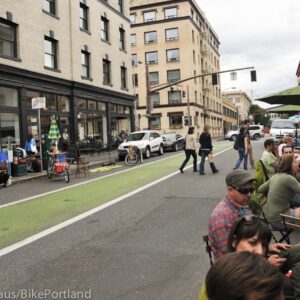
Two Metro councilors — Kathryn Harrington and Robert Liberty — traveled to Washington D.C. yesterday to accept a National Award for Smart Growth Achievement from the U.S. Environmental Protection Agency.
Metro was one of five communities to be recognized. They received the award in the “Policies, Programs, and Regulations” category specifically for their 2009 Making the Greatest Place campaign. That effort helped spur action their regional 2040 Growth Concept plan.
In a statement, Robert Liberty said, “This is a great honor for our region, and validates the policies and investments we have made to make our communities better and connect them with many types of transportation.” Kathryn Harrington added that it’s “nice to be recognized at the federal level for the groundbreaking work in our region”.
One of the key policies that came out of Metro’s “Making the Greatest Place” planning project was to maintain the urban growth boundary and then increase travel choices close to where people live so they don’t need to drive as much. Because of this, Metro says the average Portland resident drives four miles less per day than people in other U.S. cities of similar size.
Metro also points out that, “Transit and cycling are increasing faster than population growth, with more than 90 percent of the region’s residents living within one-half mile of transit lines.” Thanks to the Portland Bureau of Transportation, by 2013, about 80 percent of Portlanders will live within a half-mile of a bike boulevard.






someday someone will hand out an award for the ‘greatest non-growing place’ and the award above will be recognized for the oxymoron that it is. There’s no such thing as smart growth when it comes to a city, region, or community. The smart thing is to figure out how to avoid growth. Alternatives to Growth Oregon was a group dedicated to this right here, but unfortunately they are no longer active.
You are starting with the premise that growth, in itself if a bad thing. It’s just a process that civilizations go through and you can do it in different ways.
Non-growth is about as NIMBY as you get. You got yours, so the heck with the others. Strikes me as pretty arrogant that you believe you know what is best for others. If you were really “non-growth”, you’d cease your own existence.
You’re also missing the point that the award publicizes those policies that help curb growth, and do it in a more sustainable manner.
Don’t you find it kind of ironic and funny that Alternatives to Growth Oregon apparently lived up to it’s name?
Unrestricted growth *is* a bad thing, and at this point there isn’t much room left for continued growth. “Anti-growth” doesn’t mean anti-life, it means anti-expansion. A lack of growth isn’t death, it’s commonly referred to as “balance” or “steady-state”. Continual growth in a closed system is impossible – at some point, the inputs can’t be expanded, or the outputs begin to negatively impact everything. We’re seeing that now. Many people believe that the world is an open system, but it’s not – it’s closed, but it’s so large that we haven’t reached the limits of growth until now. (and I use that phrase deliberately, since after more than 30 years, “The Limits to Growth” has been proven to be frighteningly accurate – we are right on target for the “Business as usual” scenario in the World3 Model.
Unrestricted growth causes overshoot and inevitable collapse. I can’t speak for your definitions, but in my eyes overshoot and collapse is in itself a “bad” thing.
Well, all right, I was using the same shorthand found in the article. I of course meant economic growth, population growth, growth in material consumption, growth outward into farmland, growth upward. You can say NIMBY, but what does it mean in this context? I’m not proud of the growth we’ve had and wish to deny others the same. The trouble I have with your characterization is that it shows we’ve forgotten how to differentiate between growth (see above) and quality of life, happiness, etc. Economic growth was once considered a means to that end, but now it is just asserted to be a necessity, its own reward; it cannot be questioned, just accommodated.
The demise of Alternatives to Growth Oregon isn’t ironic or funny to me, though I can see how you would think that,
“… you multiply, and multiply, until every natural resource is consumed. The only way you can survive is to spread to another area. There is another organism on this planet that follows the same pattern. A virus.”
Unless planning occurs the above is true.
Even with planning that’s frequently true.
exactly, only Alternatives to Growth Oregon’s point was that we’ve arrived at a point where all our planning is oriented toward accommodating growth. Planning is no panacea. What is needed is a recognition that we all lose with exponential growth, whether it is 1%/yr or 10%/yr.
The spectrum of options ranges from ‘plan for growth anywhere’ to ‘plan for growth within the expanding urban growth boundary.’ Nowhere on that spectrum are any sensible long term strategies that recognize that Oregon with twice as many people serves no purpose whatsoever. It decreases livability for everyone, and although landlords and owners of property in theory win, the sum of the degradation to all systems, natural, social, cultural outweighs those monetary gains to the few.
until a ‘children of men’ type scenario occurs i think it’s safe to say growth is inevitable. you have been to other cities recently and seen how truly horrible rampant, unchecked growth and sprawl can be, right?
also; i grew up here and if i could put up a force field around the area that prohibits more people moving here i’d do it. and if i could roll the clock back for vancouver quite a few years then put up the force field, i’d do that too. i’m concerned with the idea of my town going to hell.
I wonder how many awards METRO will win with Hughes busting the UGB for his corporate development lobbyist buddies.
This may not be the appropriate forum for this discussion, but I can’t resist putting my 2 cents in about growth.
1. Growth is not inevitable, as several countries in Europe are finding out (Italy, Greece, Germany, etc). The formula for containing growth is surprisingly simple. a) Access to contraception. b) Education (especially for women). c) Empowerment of women. d) limits on immigration. Depending on the country/culture in question, usually at least one of these four are controversial. For example, I would argue immigration is the most heated of the four here in the US, whereas empowerment of women is more of an issue is Saudi Arabia.
2. Our economic system is built around growth. The concepts of interest and inflation are tied into this paradigm. I don’t pretend to have an answer to this, but I know some economists such as Herman Daily have been working on systems not relying on growth for years. Are they realistic? Who knows.
3. A lot of our problems, especially environmental, are tied to population and growth. From climate change to pollution to species habitat. You name almost any environmental issue, and population is a key factor. You may decrease the average number of miles driven by an Oregonian by 10% by next decade. But if the population increases at even a slow rate, you still come out behind in terms of total number of miles driven. Try doing the math on any environmental issue dear to your heart. A growth rate of only 2% a year results in a doubling of the population within about 35 years. That means you need to halve the pollution per capita output in question, just to come out even.
4. Smart growth is much better than unfettered growth.
Awesome post. I agree, except on one point – even with all the items you list in point 1, local growth can still occur. We see that here in Oregon – Oregon is a more desirable place to live than much of California, or Detroit, Atlanta, Dallas, etc – that many are moving here from those locations. If things continue to get worse overall, Oregon (and Portland in particular) will continue to see growth due to external pressures, until it becomes less desirable, either through size/density related issues like crime or due to increased housing and goods costs. It’s gentrification on a national scale.
all good points, Viking. I’d only disagree with two of the things you said:
(1) “systems not relying on growth for years. Are they realistic? Who knows.”
I think you’d probably agree that our current largely unquestioning commitment to perpetual growth of all kinds is unrealistic.
(2) “Smart growth is much better than unfettered growth.”
This is a familiar trope, but I’m not so sure. Is having Walmart sell more compact fluorescent lights than anyone else better than if they didn’t sell CFLs? Are electric cars better than what we have now? Are higher efficiency electric heat pumps an improvement? It all depends on whether the marginal/relative/feel-good improvement (smart growth, big box goes green, electric cars, higher efficiency widgets) lulls us into thinking these are solutions, when they so clearly are not. The problems all of these technologies or strategies purport to address require a much larger reorientation, not incremental tweaks. Smart growth, like energy efficiency, in my view *could* be worse than doing nothing in the sense that they further delay the point when we recognize the full scope of the problem. During that period of delay we will have bought/produced/installed another million electric heat pumps, half a million electric cars, and will have grown by another 100,000 people. To what end? When do we get to say ‘Enough!’